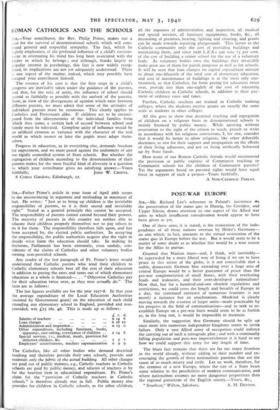Sta,—Father Prime's article in your issue of April 26th seems
to me unconvincing in argument and misleading in statement of fact. He writes: "Just as to bring up children is the inviolable responsibility of parents, so it is their sacred and inviolable right." Stated as a general principle this cannot be accepted. The responsibility of parents cannot extend beyond their powers.
The majority of parents in this country are neither able to educate their children properly themselves nor to pay others to do it for them. The responsibility therefore falls upon, and has been accepted by, the elected public authorities. In accepting the responsibility, the public authorities acquire also the right to decide what form the education should take. In making its decisions, Parliament has been extremely, even unduly, con- siderate of the claims of Catholics and other voluntary bodies owning non-provided schools.
Any reader of the last paragraph of Fr. Prime's letter would understand that Catholic parents who send their children to Catholic elementary schools bear all the cost of their education in addition to paying the rates and taxes out of which elementary education as a whole is financed—. . . "Otherwise Catholics pay
for their education twice over, as they now actually do." The facts are as follows :
The last figures available are for the year 1937-8. In that year the average expenditure of the Local Education Authorities (assisted by Government grant) on the education of each child attending any elementary school in England, provided and non- provided, was L15 16s. 4d. This is made up as follows: Salaries of teachers Administration and inspection... ... Other expenditure, including furniture, books,
apparatus, care-taking, conveyance of children ... Special services, i.e., medical, meals, provision for
defective children, &c.
Employers' contributions, teachers superannuation
The Catholics, like all other bodies who demand doctrinal teaching and therefore provide their own schools, provide and maintain only the fabric of the actual building. All other charges are paid out of public moneys, e.g., Catholic teachers in Catholic schools are paid by public money, and salaries of teachers is by far the heaviest item in educational expenditure. Fr. Prime's claim for the "provision of Catholic teachers in Catholic schools" is therefore already met in full. Public money also provides for children in Catholic schools, as for other children, £ s. d.
9 14 6 o 18 to o 13 o
all the expenses of administration and inspection, all medical and special services, all furniture equipments, books, &c., all decorating of premises, heating, lighting and cleaning, and grants can be made towards repairing playgrounds. This leaves to the Catholic community only the cost of providing buildings and maintaining them, and since 1936 L.E.A.s can vote 75 per cent. of the cost of building a senior school for the use of a voluntary body. As voluntary bodies own the buildings they invariably make great use of them for parish purposes as well as for schools. It will be seen that loan charges on capital expenditure amount to about one-fifteenth of the total cost of elementary education, and cost of maintenance of buildings is at the most only one- twentieth, so that Catholics, far from paying for education twice over, provide less than one-eighth of the cost of educating Catholic children in Catholic schools, in addition to their pay- ment of ordinary rates and taxes.
Further, Catholic teachers are trained in Catholic training colleges, where the students receive grants on exactly the same scale as students in other colleges.
All this goes to show that doctrinal teaching and segregation of children on a religious basis in denominational schools is mainly financed by public money. While agreeing without reservation to the right of the citizen to teach, preach or write in accordance with his religious convictions, I, for one, consider that it would be better to allow religious, like other debatable doctrines, to rest for their support and propagation on the efforts of their living adherents, and not on being artificially bolstered up by State funds.
How many of our Roman Catholic friends would recommend the provision at public expense of Communist teaching or Communist schools for the children of Communist parents? Yet the arguments based on parental rights would have equal force in support of such a project—Yours faithfully,
A NON-CATHOLIC PARENT.


































 Previous page
Previous page